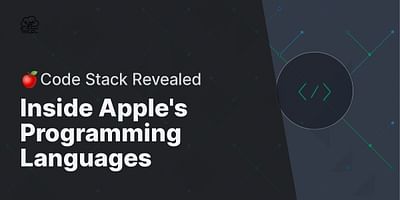Vernon is a passionate Linux user with over 15 years of experience. He takes pleasure in exploring the diverse Linux distributions and dabbling with innovative software. His expertise and curiosity continue to fuel his technological journey.
Programming languages are the backbone of modern technology, allowing us to communicate with computers and create amazing software. But have you ever wondered who is behind the development of these programming languages? Who are the masterminds that create the tools we use to bring our ideas to life?
The development of programming languages is a collaborative effort, often involving teams of talented individuals with a deep understanding of computer science and a passion for innovation. These individuals, known as language designers or language creators, play a crucial role in shaping the way we write code.
One of the most influential figures in the world of programming languages is Dennis Ritchie, the creator of the C programming language. C, which was developed in the early 1970s, has had a profound impact on the field of software development and is still widely used today. Ritchie's work on C laid the foundation for many other programming languages, including C++, Objective-C, and even the operating system Unix.
Another notable language creator is Bjarne Stroustrup, who is responsible for the development of C++. C++ is an extension of the C programming language and introduced features such as classes and object-oriented programming. Stroustrup's work on C++ has made it one of the most popular programming languages in the world, used extensively in areas such as game development, embedded systems, and high-performance computing.
Guido van Rossum is the creator of Python, a programming language known for its simplicity and readability. Python has gained immense popularity in recent years, thanks to its versatility and extensive library support. Van Rossum's vision for a language that is easy to learn and use has made Python a favorite among beginners and experienced developers alike.
The development of programming languages is not limited to individuals. Organizations such as the Apache Software Foundation and the Python Software Foundation play a crucial role in the evolution of programming languages. These foundations provide a platform for collaboration and community-driven development, ensuring that programming languages continue to evolve and meet the needs of developers worldwide.
It's important to note that programming languages are not static entities. They continue to evolve and adapt to the changing needs of the industry. Language designers and creators are constantly working on new features, improving performance, and addressing security concerns. This ongoing development ensures that programming languages remain relevant and continue to empower developers to create innovative solutions.
In conclusion, the development of programming languages is a collaborative effort involving talented individuals and organizations. Language designers and creators, such as Dennis Ritchie, Bjarne Stroustrup, and Guido van Rossum, have made significant contributions to the field of software development. Their work has shaped the way we write code and has paved the way for the creation of countless innovative applications and technologies.















